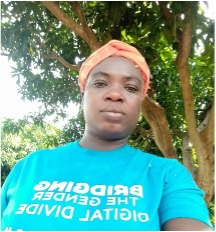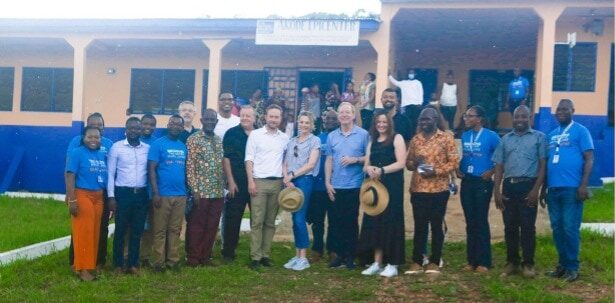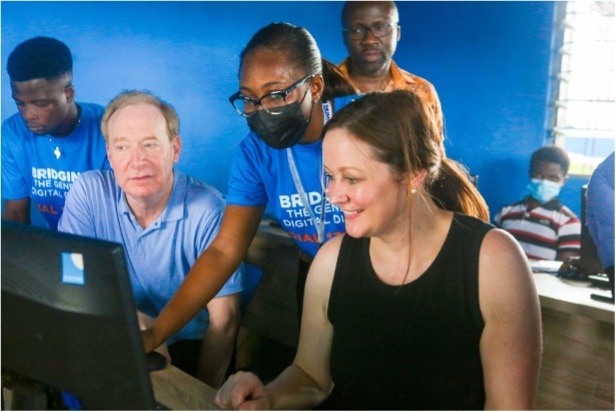ACCRA, GHANA (May, 2022)
Senior leadership from The Hunger Project, BLUETOWN and Microsoft traveled to Ghana in March to demonstrate their commitment to reducing the digital divide in rural Ghana. A delegation of senior leaders from these organizations visited The Hunger Project’s Akode Epicenter in Ghana’s Eastern Region to meet with participants of the Women’s Meaningful Access Project —a recently launched pilot program with USAID bringing high speed internet access to more women in rural Ghana.
During the visit, the delegation had the opportunity to meet many of the participants in the Women’s Meaningful Access Project, which has connected around 6,000 women to vital online resources that they utilize to create waves of lasting development in their communities. The pilot program aims to address the gender digital divide by providing women access to information about education, agriculture, health, government initiatives, finance and business management and to become active members of the digital economy.
Pictured above: Brad Smith, President, Microsoft, and Teresa Hutson, VP, Tech and Corporate Responsibility of Microsoft, access the internet at The Hunger Project’s Akode Epicenter ICT Center.

“My status has changed to become part of the global village through the power of ICT.”
Fidelia, Health Volunteer with THP-Ghana
Fidelia has been an active member of The Hunger Project for seven years. “I have never regretted it. I am currently a Health Volunteer, WASH animator, WEP animator and a Women’s leader among the 7-member epicenter executives.” In 2021, The Hunger Project, BLUETOWN, Microsoft and USAID opened an ICT center at the epicenter. “Some of us decided to enroll as learners. Before this project, I had no knowledge of how to use the computer, nor did I know the parts. Now I have basic knowledge through the help of the micro-operators.”
Fidelia makes and sells beaded jewelry and the Internet is helping her grow her business. “I use the internet to search for new designs and techniques of producing admirable bead products. I have also created Facebook and WhatsApp accounts to market my bead products.”
Representatives included Tim Prewitt, President and CEO of The Hunger Project, Nick Pallesen, Executive Vice President and Chief Commercial Officer of BLUETOWN, Brad Smith, President and Vice Chair of Microsoft, Teresa Hutson, VP, Tech and Corporate Responsibility of Microsoft, among others.
The gender digital divide blocks more than two billion women from accessing agriculture, health, education and civic engagement opportunities and solutions — and the divide is only getting worse. According to USAID, women are 14% less likely to own mobile phones than their male counterparts, and 43% less likely to engage online.
The digital access project is a collaboration of BLUETOWN’s successful rural connectivity model, The Hunger Project’s proven programs, methodologies and educational content, and the technical expertise and scale of Microsoft’s staff and operations funding and support from the United States Agency for International Development (USAID). To ensure rapid adoption of digital services, the project leverages the already-mobilized communities at the heart of The Hunger Project’s Epicenter Strategy. Women in the communities have been trained as digital operators to manage the Internet cafés, encouraging women’s participation in the digital community and creating micro-entrepreneurial opportunities.
Impressions from Key Members of the Delegation
“Connecting with the women in this program was truly inspiring. They are using the Internet to expand their businesses, learn about health and wellness, and further their education. It’s clear from our visit today that these women, and their families, are taking full advantage of this new resource to generate progress for their community.”
Tim Prewitt, President & CEO, The Hunger Project
“It was a pleasure visiting the Akode community together with our partners from Microsoft and The Hunger Project and inspiring to meet some of the many women benefitting from The Women’s Meaningful Access Project. This pilot project is an excellent example of how industry, non-profit, government, and local rural communities can collaborate for positive impact and digital inclusion.”
Nick Pallesen, Executive Vice President and Chief Commercial Officer, BLUETOWN
“Efforts like the Women’s Meaningful Access Project help level the playing field for women in Ghana so they too can access the benefits of connectivity. Empowering women with digital skills, devices, and broadband not only allows them to enter the digital economy, but arms them with the necessary resources to thrive in today’s connected world.”
Teresa Hutson, Vice President, Tech and Corporate Responsibility, Microsoft

Photo Details
The visiting delegation at Akode Epicenter: Brad Smith, President Microsoft, Carol Ann Browne, GM, Chief of Staff to the President, Teresa Hutson, VP, Tech and Corporate Responsibility, Daniel Brown, Associate General Counsel for the Middle East and Africa, Dima Sari, Government Affairs Lead for the Middle East and Africa; (from Bluetown) Nick Pallesen, EVP, Chief Commercial Officer, Ole DeLeeneer, Ghana Country Director, Ann Fesu, Womens Meaningful Access Project Manager, Michael Charway, Commercial Director; (from The Hunger Project) Tim Prewitt, President & CEO, Rowlands Kaotcha, Global Vice President, Samuel Afrane, Country Director-Ghana, Isaac Olesu- Adjei, Director of Partnership Building and Resource Mobilization, Consolata Dassah, Director of Programs, Francis Osei-Mensah, Monitoring and Evaluation and Learning Officer, Stephanie Ashley, Project Manager, Women’s Meaningful Access Project, Charles Dzamesi, Project Officer Akode Epicenter.
BLUETOWN is a last-mile, rural Internet and digital content service provider on a mission to connect the unconnected. In close collaboration with governments, NGOs, corporations, and other stakeholders is BLUETOWN currently engaging in digital inclusion projects in Ghana, India, and Mozambique, providing affordable and accessible connectivity to more than 3 million people in previously unserved or underserved communities. BLUETOWN is headquartered in Copenhagen, Denmark, with a presence in Ghana, India, and The United States. To learn more, visit https://bluetown.com.
Founded in 1977, The Hunger Project is a global non-profit organization whose mission is to end hunger and poverty by pioneering sustainable, community-led, women-centered strategies and advocating for their widespread adoption in countries throughout the globe.
The Hunger Project is active in 22 countries, with global headquarters based in New York City. The Hunger Project is global movement of individuals and organizations that includes members in the United States and Partner Countries (Australia, Canada, Germany, The Netherlands, New Zealand, Sweden, Switzerland and the United Kingdom) investing in 15,000 communities throughout Africa (Benin, Burkina Faso, Ethiopia, Ghana, Malawi, Mozambique, Senegal, Uganda and Zambia); South Asia (Bangladesh and India); and Latin America (Mexico and Peru) who are leading their own change. To learn more, visit www.thp.org.

